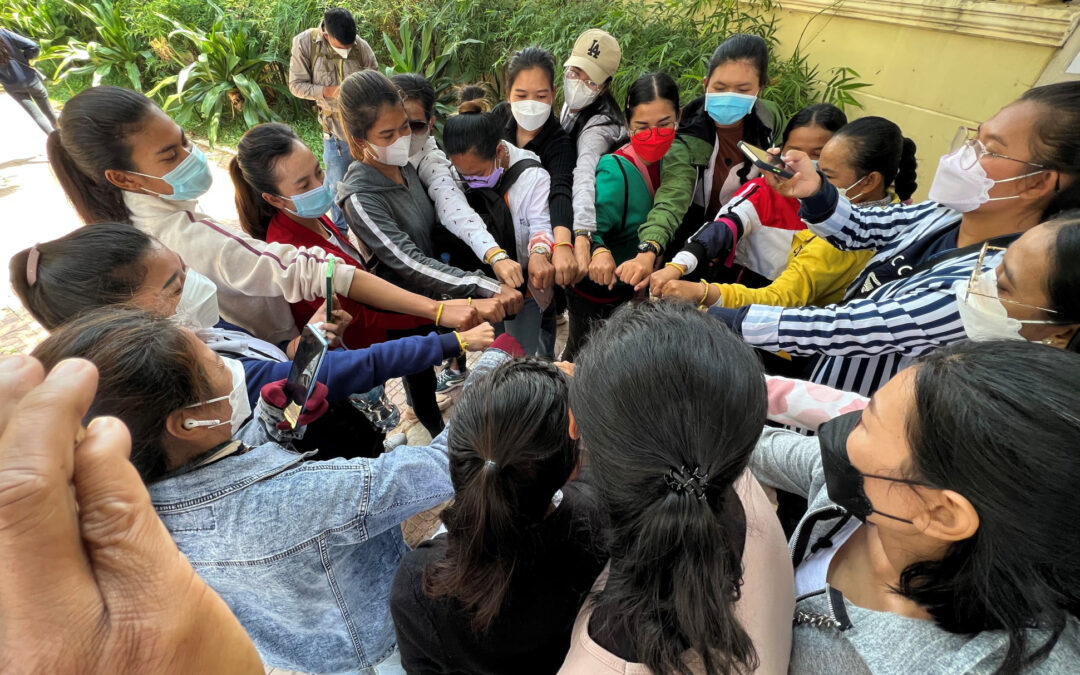
Jan 24, 2022
Striking workers at NagaWorld hotel and casino complex in Phnom Penh, Cambodia, petitioned several embassies and consulates this week asking them to contact the government about the arrests of union leaders and urge officials to respect human rights.
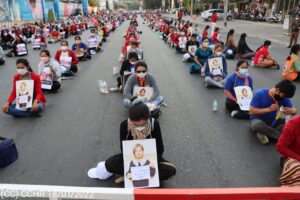
Credit: CCHR
During a police raid on union offices December 31, nine union leaders were arrested and computers and phones seized. Four days later, union president Sithar Chhim was violently taken away by plain clothes police while attempting to join her colleagues on the picket line. Chhim and the other union leaders at the Labor Rights Supported Union of Khmer Employees of NagaWorld union (LRSU) are charged with incitement, which carries a sentence of up to five years in prison.
(Send a message to the Cambodian prime minister asking for union leaders’ immediate release.)
An additional 15 striking workers were arrested January 3 as they peacefully walked the picket line. Thousands of slot machine workers, dealers, housekeepers and technicians have been on strike for more than a month, demanding the reinstatement of 365 employees who were fired in April. While management asserts the layoffs were due to COVID-19, union leaders say those laid off were all union leaders and activists. Chhim and eight other union activists are being held in two separate detention centers under a 21-day quarantine, and so denied any visitors, including their lawyers.
“It is obvious that the company wishes to destroy the union,” Chhim said late last year.
The layoffs took place shortly after the union won a wage increase that boosted pay between 18 percent and 30 percent and secured the reinstatement of Chhim, who was suspended from her job in September 2019 for defending the right of a union member to wear a shirt with a message that called for higher wages. Chhim has worked at NagaWorld since 2007.
Global Condemnation of Arrests
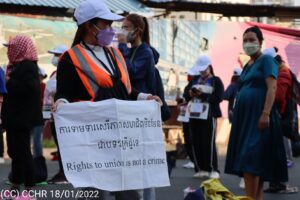
Credit: CCHR
Civil society groups have noted that the Ministry of Labor has not addressed worker reinstatement, the workers’ foremost demand. Union leaders called a strike for December 18 after management refused to talk with the union for weeks and remained silent during mediation meetings with the Ministry of Labor.
Officials at the United Nations, the International Labor Organization (ILO) and global human rights organizations have condemned the arrests, with ILO Director General Guy Ryder calling for their immediate release. “Arrests and imprisonment in connection with peaceful strike action constitute a serious interference with civil liberties in general and trade union rights in particular,” Ryder says in a letter to the Cambodian prime minister.
In 2020, the International Trade Union Confederation assigned Cambodia its second lowest rating in its annual Global Rights Index, indicating the country offers “no guarantee of rights” to forming unions, peacefully assembling, striking or collectively bargaining.
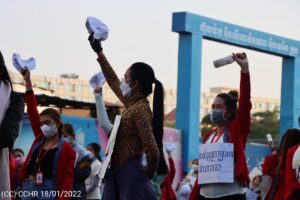
Credit: CCHR
Union leaders say NagaWorld has a long pattern of anti-union actions in Cambodia that began as early as 2010 when the global food, hospitality and service workers union IUF filed its first complaint to the ILO Committee on Freedom of Association regarding the unfair termination of 14 union leaders and members. The company’s repeated attempts to deny worker rights include lax safety and health protocols, with workers saying the company in 2021 ignored their calls for safety measures to protect employees from contracting COVID-19 and for transparency in reporting outbreaks.
NagaCorp, a five-hotel resort and casino, has an exclusive, multidecade license to operate in Phnom Penh and despite pandemic lockdowns, reported substantial profits in 2019 and 2020.
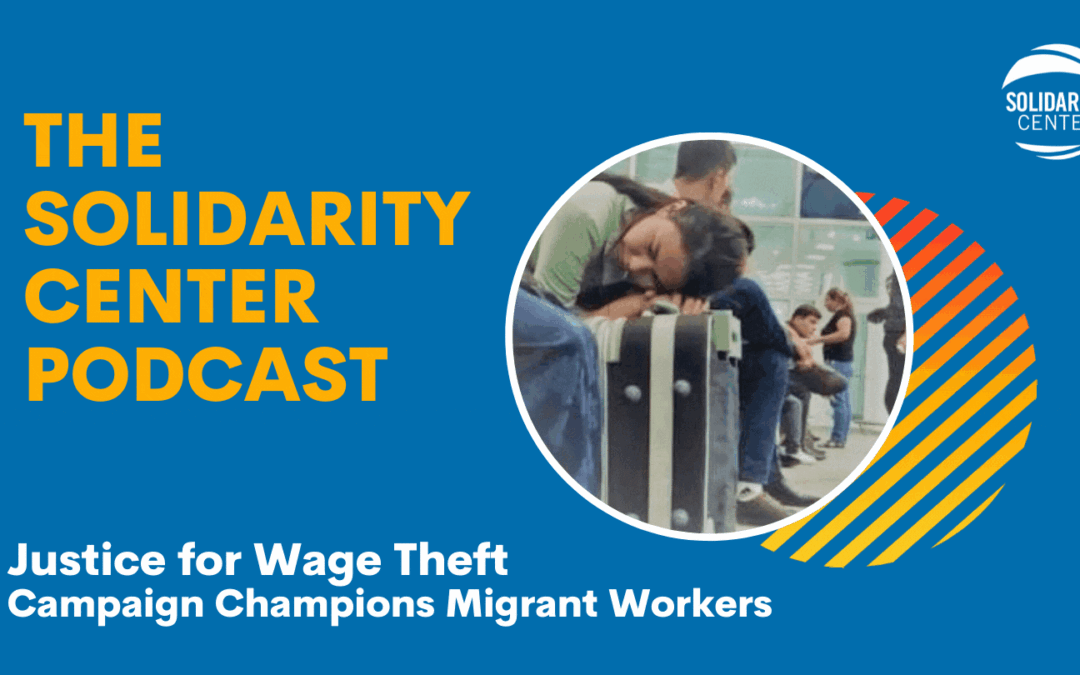
Dec 15, 2021
Millions of migrant workers trapped in pandemic lockdowns were forced to leave their employers and return home—bearing all the costs even as they often were unpaid for the work they had performed, says Michael Joachim, co-founder and director of the Plantation Rural Education and Development Organization in Sri Lanka.
“Wage theft was already there, but then during COVID-19, it happened on a mass scale,” Joachim tells Solidarity Center Executive Director Shawna Bader-Blau on the latest episode of The Solidarity Center Podcast.
“Normally, a migrant worker would be paid a return ticket by the employer. Failing which, the host country in some way contributes to their return,” Joachim says. “So, nothing like that happened. The migrant worker had to pay his own money for the return ticket. Pay his own money for quarantine, pay his own money to get back home. So, he completely lost everything. Now, if you just imagine, a person who had borrowed money to go abroad.
“And then, he also borrows money to come back. Because, to come back also, for the return ticket, for quarantine, he had to still borrow money.”
Joachim’s organization is part of the Justice for Wage Theft Campaign, a global network of unions and migrant rights organizations, including the Solidarity Center, formed during the pandemic to push for governmental and employer reforms to ensure migrant workers have access rights fundamental to all workers.
Listen to This and All Solidarity Center Podcasts
Listen here to find out how the Justice for Wage Theft campaign is working to level the playing field for migrant workers or check it out on Spotify, Amazon, Stitcher or wherever you subscribe to your favorite podcasts.
Download all Solidarity Center episodes here and be sure to check out more episodes from Season Two:
The Solidarity Center Podcast, “Billions of Us, One Just Future,” highlights conversations with workers (and other smart people) worldwide shaping the workplace for the better.

Dec 14, 2021
Some 600 Maldivian fishers from the Bodukanneli Masveringe Union (BKMU) protested offshore from the capital, Male, December 10, demanding that the government of the island nation address 11 demands.
Fishers say the government must address job safety and health concerns and stop environmentally damaging practices that impact fisheries, such as land reclamation projects, and introduce penalties for those who dump plastic in the ocean.
Protesters also are asking the government to reconsider a previously rejected proposal on educating and training fishers on sustainable fishing practices. BKMU submitted a proposal to the government for funding to conduct education programs for fishers on sustainable fisheries, safety at work and fishing for “A grade” fish, but the government rejected the proposal.
 Maldivian President Ibrahim Mohamed Solih, who was present at the protest, addressed the gathering.
Maldivian President Ibrahim Mohamed Solih, who was present at the protest, addressed the gathering.
“The government will listen to workers voices, and workers from all sectors, be it fishermen, tourism workers, agriculture workers or any other sector. They have the right to have these protests and raise concerns and demands.”
The president welcomed the protest and said he would fulfill fishers’ demands by incorporating them into the government’s long- and short-term goals.
Unions affiliated with the Maldives Trade Union Congress (MTUC), a Solidarity Center partner, took part in the protest.
The fishers also are asking the government to:
- Provide incentive pay for sustainable, clean catch
- Set prices that do not harm to the environment
- Revitalize the tuna industry—prioritize the fisheries industry as much as the tourism industry
- Take steps to protect the environment, for example, by banning the dumping of plastics in the sea
- Enact the Industrial Relations Act and Occupational Health and Safety Act.
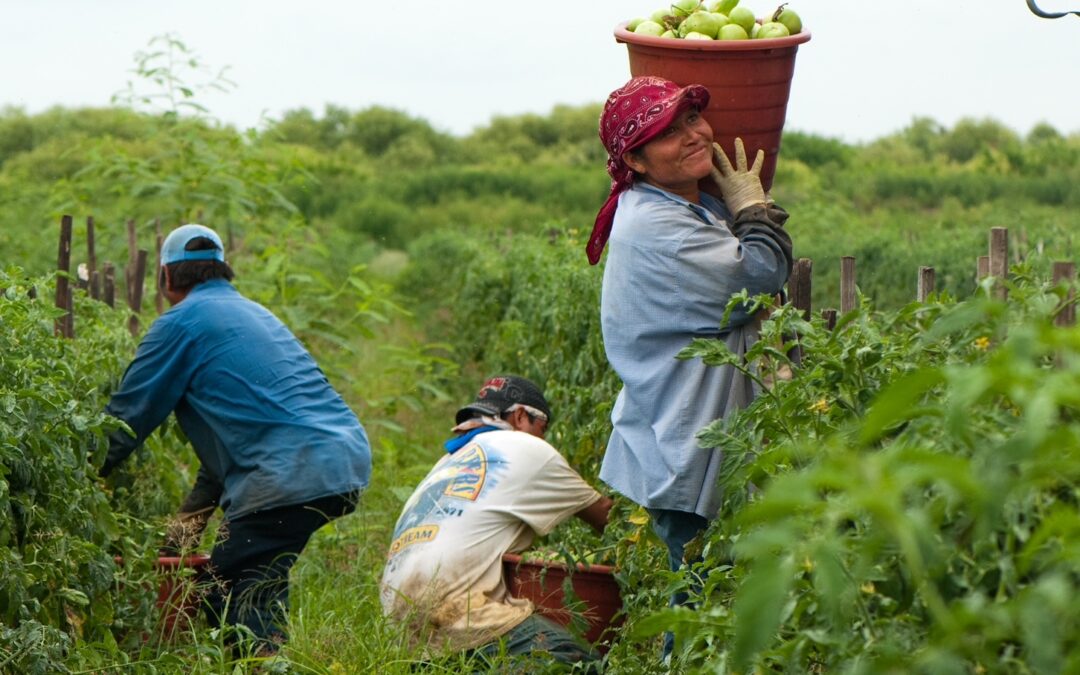
Dec 10, 2021
Millions of workers around the world engage in paid labor—yet do not receive their wages. In addition, getting employers to pay workers what they are owed often is difficult—especially for those who have migrated for work, according to a new report from the Migrant Justice Institute.
“All of the risks and costs of wage recovery are placed with the party least able to bear them: the migrant worker,” says Laura Berg, co-executive director of the Migrant Justice Institute and co-author of the report, “Migrant Workers’ Access to Justice for Wage Theft.”
The report draws on a year of global consultations and analysis across all regions, identifying common drivers of wage theft to propose specific, practical reforms that can underpin global, national and local wage theft campaigns. It is co-authored by Migrant Justice Institute Co-Executive Director Bassina Farbenblum.
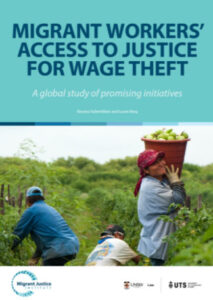 Wage theft—which also includes being paid less than the minimum wage, or not being compensated for overtime or sick leave—increased during the COVID-19 pandemic, especially for migrant workers who were required to return to their home countries at the start of the pandemic and who then had no recourse for obtaining their unpaid wages.
Wage theft—which also includes being paid less than the minimum wage, or not being compensated for overtime or sick leave—increased during the COVID-19 pandemic, especially for migrant workers who were required to return to their home countries at the start of the pandemic and who then had no recourse for obtaining their unpaid wages.
But the magnitude of wage theft prior to the pandemic makes clear it happens by design.
“Wage theft is not just the result of a few bad employers. It’s part of a business model in many supply chains,” said Elizabeth Frantz at the Open Society Foundations. Frantz moderated a Migrant Justice Institute virtual panel December 7 to launch the report. (Watch the full event here.) OSF funded the report and virtual panel.
Speaking at the event, Jill Wells, with Engineers Against Poverty, described how a complex system of supply chain contracting in Qatar, where she worked on construction for the 2022 World Cup, often led to wage theft for migrant workers. Without laws and enforcement mechanisms to ensure migrant workers get compensated, even private organizations can only go so far to assist migrant workers, said Ben Harkins at the International Labor Organization (ILO), which has established Migrant Resource Centers in several Asian countries.
“Let’s be clear—this is not just a simple issue of wage arrears as many try to classify the issue, as if it’s just a clerical error. This is theft. And it’s outrageously common and getting worse during the pandemic,” said Solidarity Center Executive Director Shawna Bader-Blau, who took part in the panel. The Solidarity Center and the International Lawyers Assisting Workers (ILAW) network supported the report and organized the regional consultations.
Holding Employers Accountable, Expanding Labor Laws
A big barrier to accessing justice is migrant workers’ fear of employer retaliation. “Most migrant workers are unlikely to file a claim because they fear being deported, losing their job or other forms of retaliation,” the report says.
Although the report finds no single solution will ensure migrant workers receive their due compensation or can access justice if they do not, it details measures government officials and employers should take. For instance, migrant workers should receive permission to stay in country to pursue wage claims. If they return home without pay, they should be able to lodge wage claims through video testimony or online courts.
Because the system generally favors employers, migrant workers are forced to prove their claims, and it is extremely difficult for migrant workers to provide evidence of their work and the unpaid wages. The report recommends shifting the burden of proof to employers with legal presumptions in workers’ favor regarding duration of employment hours worked, wages owed and so on.
Holding employers accountable also is essential. “Employers facing a wage judgment simply liquidate or refuse to pay. They won’t be held responsible by suppliers or contractors,” said Berg. The report lists options for enforcing a determination and collecting payment, such as holding licensing of employers, deregistering a business and suspending orders until workers receive what they are owed.
Freedom to Form Unions Key to Migrant Worker Rights
Governments must extend labor law coverage to all workers, according to the report. Most migrant workers are not protected by labor laws, which establish minimum wages, job safety and health guidelines, and social protection coverage like paid sick leave and time off. And, most migrant workers are prohibited from forming unions to collectively champion decent working conditions.
The most marginalized workers are especially vulnerable to wage theft, and debt incurred when they are unpaid renders them vulnerable to forced labor, said Franz.
“This study focuses on initiatives by governments and state actors, but recognizes that often those mechanisms just aren’t enough,” said Bader-Blau. “To truly recover stolen wages and ensure migrant worker justice, this has to be combined with collective action of migrant workers around the world.”
Fundamentally, says Bader-Blau, “We must continue to support freedom of association, the right to organize and collectively bargain for all workers regardless of their nationality, gender, sector or immigration status as the primary mechanism to prevent and address rampant wage theft of migrant workers.”
Says Frantz: “It’s clearly time for business and government to recognize that it is ethically unacceptable to let the risks and burdens of wage recovery lie with migrant workers rather than business and government.”
Panel participants also included Terri Gerstein from the Harvard Labor and Worklife program; Douglas Maclean, Justice Without Borders; and Apolinar Tolentino, Building and Wood Working International.
The report is part of an ongoing global campaign titled Justice for Wage Theft organized by Building and Wood Workers’ International (BWI), Migrant Forum in Asia, Lawyers Beyond Borders Network, Cross Regional Centre for Migrants and Refugees, South Asia Trade Union Council (SARTUC), ASEAN Services Employees Trade Union Council and the Solidarity Center.
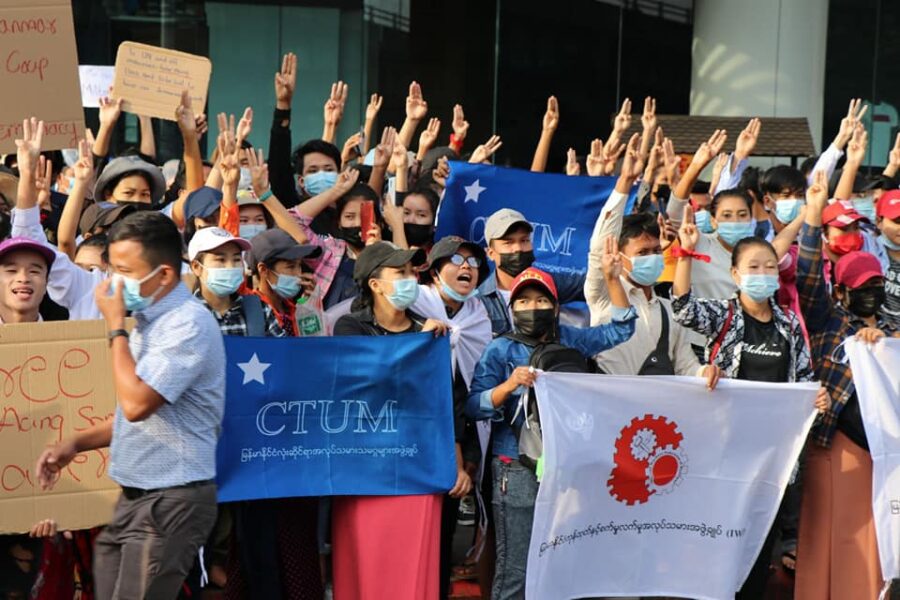
Dec 7, 2021
Democracy enables workers and their unions to flourish, and as it is increasingly threatened around the world, democracy also depends on working people and their organizations to keep it vibrant, according to speakers at the high-level event, “Worker Organizations’ Vital Role in Democracy.” (Watch for the full recorded session here.)

“We stand with all workers everywhere who are on the front lines of democracy”—AFL-CIO President Liz Shuler. Credit: Solidarity Center
“Threats to democracy go hand-in-hand with threats to workers’ right to form unions,” said AFL-CIO President Liz Shuler, speaking at the November 7 virtual forum. “We stand with all workers everywhere who are on the front lines of democracy in their countries and their workplaces.”
The forum, an official side event of the December 9-10 U.S. Summit for Democracy, brought together union leaders, labor ministers and philanthropic organizations from around the world to highlight the role of worker voice and worker rights as fundamental components of democracy and spur global action in support of freedom of association and collective bargaining.
“Worker Organizations’ Vital Role in Democracy” built on recommendations that emerged from four listening sessions with 250 U.S. government officials and labor leaders from Asia, Africa, the Americas, Europe and the Middle East and North Africa. The Solidarity Center, International Trade Union Organization (ITUC) and the AFL-CIO assisted in organizing the sessions.
“The freedom to form unions is a human right,” said U.S. Labor Secretary Marty Walsh, opening the event. “For global democracy to thrive, the global community must support workers right to independent organizing and bargaining.” In announcing the launch of the Multilateral Partnership for Organizing, Worker Empowerment and Rights (M-POWER) initiative, a year-long efforts by governments, unions and the private sector, Walsh said its goals include extending labor law coverage and strengthening unions.
“When we say workers need a seat at the table, we mean it.”
Democracy Under Threat: The Voice of Workers
During a session exploring worker rights, ITUC General Secretary Sharan Burrow highlighted how economic inequalities—such as the 60 percent of the world’s workers who survive through informal jobs with no rights and no protections—threaten democracy. The ITUC and global labor movement are championing a new social contract, one that includes “Jobs, jobs, jobs, jobs,” said Burrow.
It’s time to return to full employment” with rights and protections for all workers, she said, with a new social contract that includes equality and inclusion for all workers, a push reiterated by International Labor Organization Director General Guy Ryder.
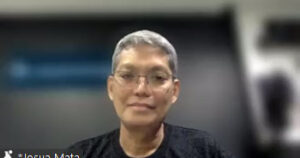
Josua Mata at SENTRO says union members are standing up to brutal assaults on democracy and freedom of association. Credit: Solidarity Center
From the Philippines, Josua Mata, general secretary of the United and Progressive Workers Center (SENTRO), described a bleak environment for workers and their unions, with more than 50 union members killed since 2016 and ongoing redtagging (branding and accusing individuals and/or organizations of being terrorists), illegal firing of union activists and anti-terrorism laws directed at stifling freedom to form unions and bargain.
“Any claim that there is freedom of association in Philippines is a lie,” said Mata. Despite the dangers, he and other union activist there are determined to persist in the struggle for democracy.
“All of this has not stopped us from continuing to do what needs to be done.”
A union leader from Brazil shared her struggle with state corruption. Yet, like Mata, Carmen Foro, general secretary of the Central Union of Workers (CUT) vowed to continue the fight for transparent and free government to enable workers to freely exercise their rights.
“Unions are indispensable to democracy,” said Foro.
In a rallying cry to workers in the United States and around the world, Randi Weingarten, president of the U.S.-based American Federation of Teachers (AFT) said workers must see the struggle to engender and preserve democracy “the same as we would fight for a collective bargaining contract. The fight for democracy is the same as the fight for wages, the fight for dignity.”
Said Solidarity Center Executive Director Shawna Bader-Blau: “No social or political progress happens by magic. Change is pushed by people working collectively. And legitimacy of the government comes from the people.”
Launching a Global Year of Action
Partners in the M-POWER initiative will come together in a year to evaluate progress and recommit to improving worker rights worldwide. Announcing a $100 million pledge by philanthropic organizations through Funders Organized for Rights in the Global Economy (FORGE), Open Society Foundation Executive Director Thomas Periello said the commitment is an important statement for philanthropy to do its part keep worker rights and justice central to its work around the world.”
“As we see rise of threat of authoritarianism around the world, democracies need to deliver, and a huge part of that is free unions,” he said.
Government officials from the U.S. Agency for International Development (USAID), the State Department and Labor Department’s Bureau of International Labor Affairs (ILAB) shared their support of M-POWER’s goals and highlighted the U.S. government’s significant financial commitment to program.
“Governments have a foundational role in providing an enabling role for enabling free and independent unions to thrive,” said Thea Lee, ILAB deputy undersecretary.
Labor ministers from Argentina, Germany, Mexico and Norway also shared how partnerships among union, government and private sector in their countries are enabling workers to reskill and upskill, transfer to jobs in renewable energy and ensure worker rights throughout. “To protect the rights of workers, the first thing we need is a development model to have rights at center,” said Argentina’s Minister of Labor, Employment and Social Security Claudio Moroni.







 Maldivian President Ibrahim Mohamed Solih, who was present at the protest, addressed the gathering.
Maldivian President Ibrahim Mohamed Solih, who was present at the protest, addressed the gathering.
 Wage theft—which also includes being paid less than the minimum wage, or not being compensated for overtime or sick leave—increased during the COVID-19 pandemic, especially for migrant workers who were required to return to their home countries at the start of the pandemic and who then had no recourse for obtaining their unpaid wages.
Wage theft—which also includes being paid less than the minimum wage, or not being compensated for overtime or sick leave—increased during the COVID-19 pandemic, especially for migrant workers who were required to return to their home countries at the start of the pandemic and who then had no recourse for obtaining their unpaid wages.

